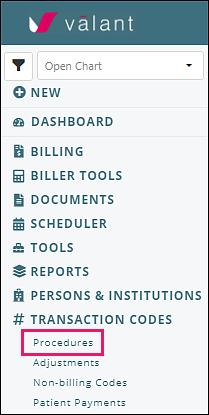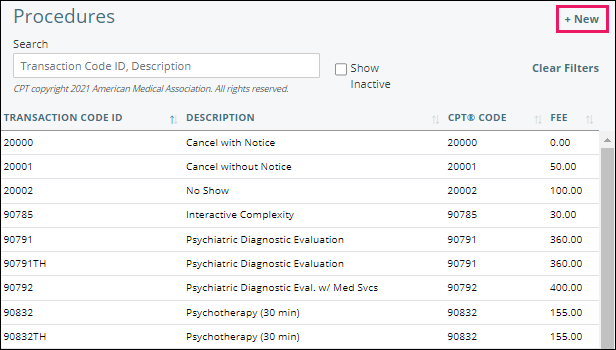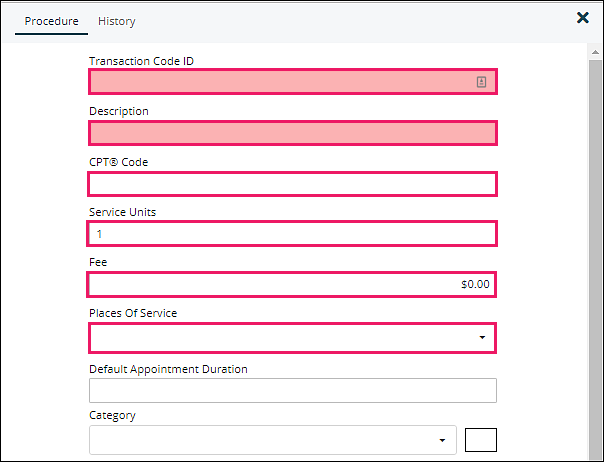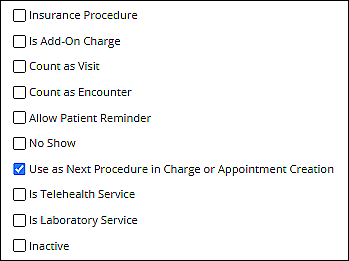CPT/Transaction Codes are maintained by the practice, based on the services offered. This list comes pre-populated from Valant with commonly used mental health codes. Additional codes should be entered by a practice as needed. For instance, when a service is provided in more than one location (in office and/or telehealth at home), a separate procedure code is needed for each with the appropriate Place of Service designated. Another example would be setting up a procedure code for a Cancellation or No Show.
Click Transaction Codes | Procedures

Adding Transaction Codes
- Click + New

- Enter specific procedure information for the code. Transaction Code ID, Description, CPT Code, Service Units, and Place of service are all required fields when adding a new code. The other fields are optional.

- Transaction Code: Cannot be modified once saved
- Description: Default descriptions are AMA behavioral health listings, can be modified
- CPT Code: Must contain a valid CPT code
- Service Units: Used for provider productivity based on time spent with patient (1 unit = 1 hour .5 units = 30 minutes) and shows on reports used for providers paid by the hour
- Fee: Practice fee for procedure
- Places of Service: Where the service occurred (Office, Telehealth, etc)
- Default Appointment Duration: Sets default length of appointment on scheduler
- Category: Applies a default color to appointments using the procedure code
Checkbox Options:

- Insurance Procedure: Indicates if a procedure code can be billed to insurance. (For example, cancellations can be billed to a patient but not an insurance company).
- Is Add-On Charge: Indicates whether or not a procedure is considered an Add-on Code.
- Count as Visit: Updates the "Last Visit" field in P&I | Patients | Demographics, and certain reports only show visits.
- Count as Encounter: Indicates whether or not this procedure counts for Meaningful Use. Is greyed out when Count as Visit is checked.
- Allow Patient Reminder: Indicates whether or not a Patient Communications | Appointment Reminder, if configured and activated, will go to the patient when they are scheduled for this procedure.
- No Show: Indicates that a procedure is being used as a No Show code. Based on this indicator, the Patient Communications | No Show Reminder, if activated, will send reminders to any patients who have the code updated for their appointment in a timely manner.
- Use as Next Procedure in Charge or Appointment Creation: Checked by default, indicates that this procedure will be automatically selected when the next appointment is created for the patient, when this is the last recorded appointment for that patient.
- Is Telehealth Service: Indicates that a procedure is being used as a Telehealth code. Based on this indicator, the Patient Communications | Telehealth Reminder, if activated, will send reminders to any patients who have the code in their appointment.
- Is Laboratory Service Checkbox: Indicates whether or not a procedure is a laboratory service.
- Inactive: Inactivates a procedure that is no longer being used. This hides it from the visible list.
Click Save when all desired options are selected.
Editing Transaction Codes
In order to edit an existing procedure code navigate to the list of codes and select an item from the list. This will allow all fields other than the Transaction Code ID to be edited. To save any changes to the code simply click Save.
